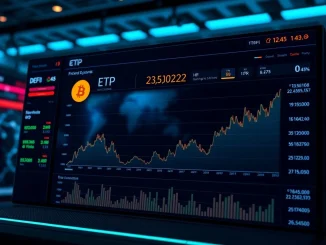
The financial world is buzzing with news that’s set to redefine how we view digital assets within traditional markets. Block, the innovative fintech giant, has officially joined the prestigious S&P 500 index, marking a significant moment not just for the company, but for the broader cryptocurrency ecosystem. This isn’t just another stock market update; it’s a powerful signal about the increasing mainstream acceptance of crypto, especially for companies with substantial Bitcoin Holdings.
Block’s S&P 500 Milestone: What Does it Mean?
On July 23, Block (formerly Square) officially became part of the elite Block S&P 500 index, replacing Hess Corporation following Chevron’s massive $54 billion acquisition. This strategic inclusion sent Block’s stock soaring by an impressive 10.7%, climbing from $72.01 on July 18 to $79.69. For investors and index-tracking funds, this meant a swift adjustment of portfolios, driving the immediate rally. Despite this recent surge, it’s worth noting that Block’s shares are still down 13% year-to-date, reflecting the broader challenges faced by fintech names in 2024. However, the company views its S&P 500 addition, announced on July 18, as a significant validation of its diversified business model, spanning Square, Cash App, Afterpay, and other platforms.
The Growing Trend of Corporate Bitcoin Holdings
What makes Block’s inclusion particularly noteworthy for the crypto community is its status as the third publicly traded company in the S&P 500 to hold Bitcoin (BTC) in its corporate treasury. This positions Block alongside industry giants Tesla and Coinbase. According to data from Bitcoin Treasuries, Tesla leads the pack among S&P 500 members with approximately 11,509 BTC, valued at around $1.4 billion, making it the 10th-largest BTC holder among listed companies. Coinbase follows with 9,267 BTC, worth roughly $1.1 billion. Block, with its 8,584 BTC valued at $1 billion, now contributes to a growing, albeit small, 0.09% weighting in the index’s crypto-adopting sector. The presence of multiple BTC-holding entities within the S&P 500 highlights a clear institutional trend: the increasing integration of digital assets into corporate balance sheets. This signals a shift in how traditional finance views cryptocurrencies, moving beyond speculative assets to valuable treasury components.
Is This the Future of Crypto Adoption in Mainstream Finance?
The inclusion of companies like Block, Tesla, and Coinbase within such a prestigious benchmark as the S&P 500 raises a pivotal question: Are we witnessing a pivotal moment for Crypto Adoption in mainstream finance? Tesla’s significant index weight and Coinbase’s 0.18% weighting demonstrate how index membership can fundamentally alter market perception of risk. This isn’t just about a stock price; it’s about legitimizing digital assets in the eyes of mandate-limited institutional investors who often rely on major indexes for their investment strategies. By being part of the S&P 500, these companies can attract a broader shareholder base, potentially increasing liquidity and stability for their stock. This integration suggests a future where digital assets are not just an alternative investment but an accepted part of corporate strategy and traditional market indices.
Navigating Fintech Performance in a Shifting Landscape
While the S&P 500 inclusion offers a significant short-term tailwind, the long-term sustainability of Block’s re-rating, and indeed the broader Fintech Performance, hinges on core business execution. Fintech stocks, including Block, have generally underperformed relative to tech-led benchmarks throughout the current year. However, inclusion in a major index like the S&P 500 can significantly reduce perceived risk and enhance liquidity, making these stocks more attractive to a wider range of investors. Block’s operational resilience and strategic innovation remain paramount. Its core revenue drivers — Square’s merchant services, Cash App’s consumer finance tools, and Afterpay’s buy-now-pay-later arm — will continue to be critical. Newer initiatives like the Bitkey self-custody wallet and the TIDAL music platform also contribute to the company’s diversification strategy, vital for sustained growth in a competitive landscape.
The Broader Impact on the S&P 500 Index
The addition of crypto-forward companies to the S&P 500 Index highlights a fascinating interplay between traditional index mechanics and evolving market sentiment. As more companies with direct or indirect exposure to digital assets find their way into major indices, it subtly shifts the composition and perception of these benchmarks. This evolution reflects the changing economic landscape, where technology and digital assets play an increasingly vital role. While analysts emphasize that index reconstitution primarily provides short-term boosts, the long-term narrative for the S&P 500 will increasingly incorporate the performance and strategic direction of companies that are at the forefront of digital innovation, including those embracing cryptocurrencies.
Block’s inclusion in the S&P 500 is more than just a corporate milestone; it’s a powerful testament to the growing institutional acceptance of digital assets. As companies like Block, Tesla, and Coinbase solidify their positions within traditional financial benchmarks, they pave the way for broader Crypto Adoption and reshape the investment landscape. While immediate stock surges are exciting, the true long-term impact will be measured by sustained business execution and the continued integration of innovative fintech solutions with the burgeoning digital economy. This moment underscores a future where crypto isn’t just a niche, but an integral part of global finance.
Frequently Asked Questions (FAQs)
1. What is the significance of Block’s inclusion in the S&P 500?
Block’s inclusion signifies a major validation of its business model and marks it as the third crypto-adopting company in the prestigious index. It enhances visibility, liquidity, and potentially reduces perceived risk for investors.
2. Which other S&P 500 companies hold Bitcoin in their treasuries?
Besides Block, Tesla and Coinbase are the other two publicly traded companies in the S&P 500 that hold significant Bitcoin in their corporate treasuries, making them pioneers in corporate Bitcoin Holdings within the index.
3. How does S&P 500 inclusion affect a company’s stock?
Inclusion typically leads to a short-term stock surge as index-tracking funds buy shares to rebalance their portfolios. It can also improve long-term liquidity and attract a broader base of institutional investors due to increased legitimacy.
4. What are Block’s primary business segments?
Block’s core business segments include Square (merchant services), Cash App (consumer finance tools), and Afterpay (buy-now-pay-later services). They also have newer initiatives like Bitkey and TIDAL.
5. Does this signal full mainstream Crypto Adoption?
While Block’s S&P 500 inclusion is a strong indicator of increasing institutional acceptance and legitimacy for digital assets, it’s part of an ongoing trend. Full mainstream crypto adoption is a continuous process that involves wider regulatory clarity, technological advancements, and broader public understanding and usage.



